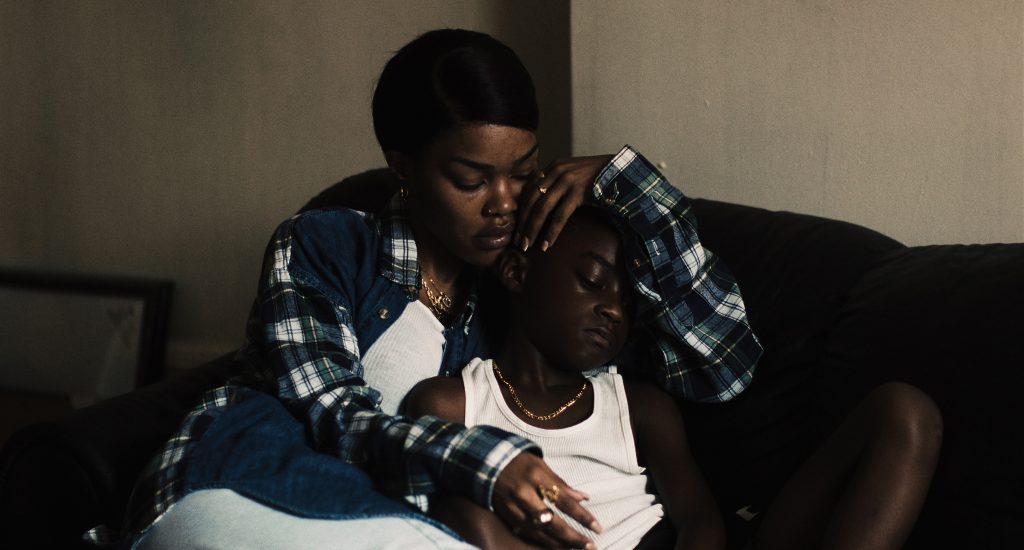Teyana Taylor might not be a household name at the moment but get ready, she’s about to be. She’s far from new to film, having already made a career in music and appearing in many film and television roles over the years. But not like this; not like A Thousand and One. For A.V. Rockwell’s feature film directorial debut, Taylor is front and center as Inez, a mother who is willing to go to whatever lengths to keep her and her son Terry together. It’s a breakout performance from Taylor, who brings a fiery passion of love and heartache to the character.
We had the chance to sit down and talk with Teyana Taylor about the film, motherhood and sacrifice. She discussed with Shakefire and other journalists how she poured herself into Inez and how this role was meant to be hers.
I can see you like my mother. She would be the same as the characters where she would do anything for me. So do you feel that some children don’t understand that aspect yet until they’re older? That they don’t really appreciate what a mother would do or the father would do how many lengths that they would go to?
Teyana Taylor: No. I think that you worded that perfectly, and I feel like I’ve been trying to say that in every interview because I want the youngins to see this so they can understand the measures that moms take and also understand that the real meaning when a when a mom says, “you only get one mother.” Without giving up the movie, she’s willing to go wherever she got to go to make sure that she’s a great mother and that she’s there for little Terry. My mom was a single mom, you know? So even at little Terry’s age, I did only understand certain things and almost would even like, complain about it. Like, “why this?” and “why, why?” A lot of whys. It’s until you actually grow up, and you become wiser, and then you have children and you understand the sacrifices and different things that you have to make as a mom. So this movie and even just taking this role made me appreciate my mom already more than what I already did.
One of them themes was heartbreak. Heartbreak from just neglect or love, heartbreak from your city, just different layers of heartbreak. I want to know, because you brought out of a lot of emotions Everybody character in this movie was out of a lot of emotions. So, I know you came from a place of an emotional place. I want to know, what was one of your biggest heartbreaks that maybe you evoked in this role?
Taylor: It was a few heartbreaks, actually. So a month before my second daughter was born, we lost our dog. That was like a lot, because I had my dog since before my first born was born. So that was my first baby. And because I was only a month away from giving birth. I never had the chance to really grieve and really mourn, because now I was like, “you can’t cry so hard, you don’t want to stress, you don’t want to..,” you know? So it was a lot of having to hold a lot of things in and then having to be on set dealing with postpartum depression. Dealing with postpartum, I was only six months postpartum while filming this film.
Then also while filming the film, I was dealing with a lot of deaths, so I would get phone calls. Every morning there was something. So during one lunch break, I’m going to this funeral. Another lunch break, I’m going to another funeral. I went to several funerals during several lunch breaks and that was a lot for me, you know. So to have to have all of that, I was able to put all of it into Inez. So every emotion that you see was real. Diving into them noodles and hitting all different emotions from crying to laughing and still tearing up them noodles, those is all real emotions. And I want to say, during that scene I had just got a call that I lost someone. So like every single emotion was real. And also a huge part of It was also being overjoyed that I had a point to prove and that God had blessed me with this opportunity to be able to let everything up into this moment that I’ve endeared that had broken my heart to just let it all out. I feel like a long time in my life, everything was bottled. And with Inez I was able to let it all out. I was able to let out my cries for my dog, let out my cries from my friends and my loved ones that I lost, ;et all my cries for all the anxiety and and depression that I was dealing with with postpartum. I was able to just let it all out. I was able to have my moment of weakness on set, because I knew that when I got back home I had to flip the switch and be super mom and leave all of that there because I couldn’t bring it home.
So also dealing with postpartum with a newborn, I couldn’t even deal with my postpartum because I had a newborn to tend to on top of a six-year-old at the time. So I was dealing with extreme heartbreak and then my husband was working at the same time. So I’m filming, he’s filming, so now I don’t have that comfort. So now I have a little bit of the abandonment issues. Of course, my mom was there every step of the way, but like I’m a big girl now. I have my family and I have my husband and my protector. The person that is to shield me dealing with this. So with him being away, it was a lot. It was a lot. I dealt with a lot of mental, emotional…life whooped Inez’s ass and at the time life was whipping my ass, Inez was whipping my ass and I was whooping the len’s ass, you know? I had to do my thing. It was go time. So it was like, “cool I got to channel this,” and it’s the complete opposite from when I record. Because when I record, I can’t be upset. Like they be like, “oh yeah, put all the anger in the booth.” I’m not that kind of person. Like, when I’m angry everything shuts down. So for me it’s like, no, I have to be stable, I have to be in a great space to go in the studio and want to record. Even if it’s like a breakup song or heartbreak song I still got to be happy.
So it’s like for this movie, it was the opposite because I’m like, no, let’s put all that into that. So it was definitely, it was a lot. She was a difficult role to play, but I knew that it was all gonna be worth it and I knew that this was the moment that was gonna really take me there. Because people have seen me in other stuff, but it was always like funny or just loud and obnoxious. Just a lot to where that could never really tell to the talent that you have. So this was also like a proper introduction, for me, as an actor.

How has your experience is being a mother, being raised by single mother and growing up in Harlem, help prepare you for this role?
Taylor: I read a lot of times after my first self tape, I definitely got the call back. At that point, it was mine to lose. It was a lot of work to be done though to fully get Inez. And with understanding AV, I understand exactly why I had to put the work in that I put in, because this is her story, you know what I’m saying? This is her baby. This is also her first script and her first feature film so for her this is something that she had to be able to trust a person with. I’m not gonna just throw it in anybody’s lap. I’m not gonna just give it to you because you’re from Harlem so this works for the aesthetic. You get what I’m saying? Because at that point, I still hadn’t had a serious role for anybody to even know if I got the chops or not, but me, that Harlem girl in me, I’m a hustler. So I’m like, “naw, I’m gonna earn this. I’m gonna do whatever I gotta do to get it.” And I did that. I did not take advantage of being from Harlem. Like cool, it was a plus, but I was able to tap in and I did have the confidence that I felt like nobody else could pull off the role, but that was also just me, one, manifesting and two, knowing what I could bring because I knew that I had a point to prove. So I knew that nobody was gonna go harder than me, because if anybody else got it over me, it’s somebody that we all probably already seen before. Somebody that we know what you got. Now it’s time to give it to a raw face, a new face and this particular dynamic.
So yeah, I worked my butt off and I got it but the Harlem parts were made really special. To be able to be grown in the 90s cause that’s one thing. To get to be grown in the 90s that was dope cuz everybody know I loved the 90s. Almost everything I love was happening. I love Harlem. I’m from Harlem. This girl is from Harlem. I love the 90s. It takes place in the 90s. I’m ready for my first real breakout role. That role that maybe will see me, that made me feel like enough. Everything was happening and it made me realize that all the years of the waiting and the tears and feeling like it was punishment, now realizing that it wasn’t punishment, the weight wasn’t punishment, it was preparation for was already written for me in the palm of God’s hands, you know? And that’s the one thing I never stopped doing. I never stopped trusting Him, no matter whether it was the tears and that’s why I respect Inez because through everything that she’d been through, all the hardship, she never folded. And I feel like I never folded. And I feel like everybody at this table has followed my journey and my career and is seeing all my ups and downs and see how I’ve still been able to keep myself above it all no matter how much it hurt, how hard it was. I feel like a lot of Inez was already within me and this was a role that was written for me even before they knew it was for me. The director and producers may not have known, well God knew and God did. Hello!
What do you think this film does to break the stereotypes surrounding adoption and those parents who may want to get themselves together and rebuild their relationship with their children or even getting their parental rights back?
Taylor: I love that. And honestly I feel like it’s never too late to say what they say, “Oh I went back to college at 40. I went back to college.” I feel like that’s how it should be all across the board. It’s never too late to love. It’s never too late to give. It’s never too late to change. It’s never too late to show and give grace, you know? I think that that’s the most important thing is knowing that it’s never too late and also know that a mother’s love is something that can’t be replaced or erased. So for me, it’s never too late for a mom to want to do better because the thing about it is, I feel like a lot of moms get blamed for putting their children up for adoption and not realizing that that may be for the better. Like because I don’t have it all the way together so I’d rather put you somewhere where I know you’ll be more stable than with me, and when I get my mind right and get myself together I’m coming back for you. It’s the same way, like we lose something we don’t say, “Well forget that thing.” We go, we get better, and we practice more, and we come back for that trophy. And that’s how it has to be with life, not just in a tournament, not just in a game, not just in who’s the best of the best of a contest. This is life. You got to be willing to dust yourself off and try again. You got to be willing to fall down and get back up. You got to be willing to not let the enemy distract you because that’s what the devil is built for, distraction. You have to look at everything as a faith walk. In that walk, no matter what it is, even when you driving, it’s gonna always be something. One day you might catch a flat tire, but you don’t say, “okay, cool, I’m gonna spend a night here and just never called the tow truck to come and pick me up, or to change my tire. I’m gonna sit here with an attitude and be upset about it.”
Life goes on. Time waits for no one. Time is not your friend. So you gotta get back up, change that tire or wait for the tow company to come, and get you right. But to sit around and harp about it and be upset and be bitter, we don’t have time for that. And I look at everything as grace over grudges. It’s never too late and I respect any mom that is willing to say, “okay, let me step back and let me get myself together and go back for what’s mine.”
The film takes place over many years from the 1990s through the 2000s, and we see multiple versions of Terry played by different actors. How did each one of them push you as an actor in the film and what did they contribute to Inez?
Taylor: I think that what made it really dope is, with little Terry, it it was a comfort because I’m already a mom. So for me, once a mom, always a mom. I don’t care if my kid or not, you know. So once my mom always a mom, so it was very easy to navigate how that set was gonna go, what we were gonna do, so a lot of those moments, I was watching the movie and I was like, “I didn’t even realize we did that.” So it was a lot of natural chemistry with me and baby Terry, and just also him feeling comfortable around me because I’m a mom so it was naturally nurturing and it was amazing. I didn’t feel like it was a challenge. To be a mom is a challenge, but to act like a mom is not a challenge. Like I said, once a mom, always mom so it was always easy to stay in that bag. And yeah, it just may set and life easy.
What got funny is my middle age Terry. When we got to talking back. My babies is only two and seven, you know. So I’m like, “oh this is what I got to prepare for?” Because the thing about it is I started to understand, I put you in this world, I’ll take you out. So all those little quotes that we would think is funny or you’re like, “oh, she just did it up,” I get it. And I understand that you have every right to tell me that you take me out of this world because the sacrifices and I’m busting my ass to make sure you got this, that, and the third and you gonna fix your lip to say blah blah blah? I get it now. Even as an adult, understanding why I got popped in my mouth or popped in my hand by my mom. Because now you on the outside and and you’re looking in and this is happening to you. It’s just like, okay I get it.
And then older Terry, my oldest Terry, cursing at me a little bit. Oh! This is what we doing? So, that’s where it got challenging, because I do feel like Inez in that space of trying to be a change woman, I think throughout the movie, she’s calmed down so much and she was a lot more reserved. So as Inez there was a lot of things that she did that I probably would have done a little bit differently, so the challenge in that is having that patience. But yeah, I love that challenge, but it felt real because I’ve never been a disrespecting kid with the cursing and all that. But I also knew how it felt to try and talk back a little bit. So the frustration that I would see in my mom’s face and tone is really, I just mirrored that. I’m receiving this as maybe what I gave when I was his age, so I’m taking in that for my mom and my aunts and ya’ll moms and aunts and the women that have come before us. Even now, just being older and just dealing with teenagers and in all. I’m old school. I get it now.
Inez has matured me in a lot of ways. Of course, I’ve always been mature and ahead of my time, but I’ve learned to appreciate so much more. Maybe even a little bit of childhood trauma that I had, of things that I didn’t understand, you know? And now realizing like, “oh, so this is what my mom was doing when I would be angry at ‘why can’t I come to work with you every single day? Why can I be around you? Why you always working?'” It’s just like, I get it now. Becoming a mom, I was getting it, but becoming Inez, I really understood the things because in the 90s and in ’96 I was Terry’s age. So to see where we was in the world in just systematic…just everything that was happening to understand that, that’s what my mom had to deal with when I was little Terry’s age and didn’t understand that. I learned a lot from diving into Inez in this role.
A Thousand and One is now playing in theaters.







